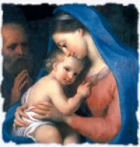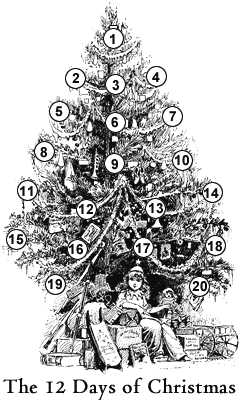
TUESDAY Year I
First Reading Isaiah 62:1-12
Second Reading
From a homily by Godfrey of Admont (Homiiiae festivales 15: PL 174,683-685)
Those illumined by the invisible
will find Jesus in the assembly of believers
The most sacred solemnity which we celebrate this day is called the Epiphany, which means "manifestation" or "appearance." We solemnly recall today three manifestations or appearances of the Lord, which he willed to make to us during his human life on earth.
The first appearance or manifestation took place at his birth when the Magi, attracted by the unusual brilliance of a new star, came by its guidance to the crib of the newborn Saviour. They worshiped him, and then having opened their treasures they offered him three precious gifts: gold, frankincense, and myrrh.
The second manifestation or appearance took place at the river Jordan in the thirtieth year of his incarnation, when he, the creator and re-creator of us all, who alone is free from any taint of sin, came to John to be baptized by him with others who were sinners. Then the heavens were opened before him, and he saw the Spirit of God in the form of a dove descending and alighting on him, and a voice from heaven said: This is my beloved Son, in whom I
am well pleased.
We read that the third manifestation took place in Cana of Galilee, where the Lord changed water into wine at a wedding feast, and manifested his glory.
These
physical
appearances or manifestations symbolically
prefigured
the way
in which
he manifests
himself
daily in a spiritual
and invisible
manner
to all
who live
holy
lives,
visiting
them within
by his grace,
and also how
those holy
and chosen souls themselves
should appear
in the sight
of the divine
Majesty.
All those blessed ones who like the Magi come to Christ's crib, by which I mean to the rigors of the spiritual warfare, not now by the transitory light of a visible star, but illurnined by the invisible, intangible grace of divine inspiration, will undoubtedly find Jesus lying sweetly asleep in the crib - that is to say, in
the assembly of believers.
However, those who are aware of having received the divine
illumination I spoke of must certainly not think they have done everything necessary by coming to the Lord's crib, and adopting the spiritual way of living they longed for, unless they also imitate the Magi in offering Christ three precious gifts: gold, frankincense, and myrrh. It is not unfitting to take gold to mean knowledge of the truth, frankincense, the devoted performance of good works, and myrrh, the mortification of the desire for human praise.
These three gifts spoken of by the evangelist are mentioned
quite clearly by Isaiah, the chosen prophet of the Lord, when he says: Everyone in Sheba will come bringing gold and frankincense, and proclaiming the praise of the Lord. Here the evangelist and the prophet can be seen to agree together very well, since where the evangelist mentioned myrrh, the prophet in place of myrrh wrote, proclaiming the praise of the Lord, thus giving myrrh a spiritual interpretation. He has in a way explained and made clear that this implies a mortification of the desire for human praise, and he has shown and almost forcibly impressed on us that those dedicated to the performance of good works must entirely mortify their desire for praise, and attribute nothing to their own powers or merits. Instead they must proclaim the praise of the Lord, humbly ascribing everything simply and solely to the grace of God.










